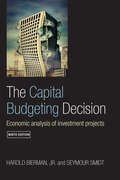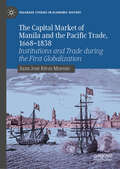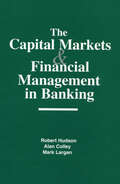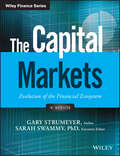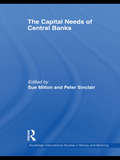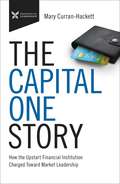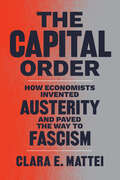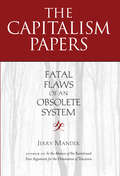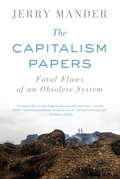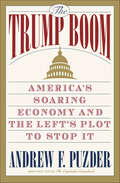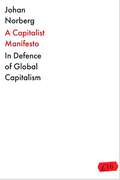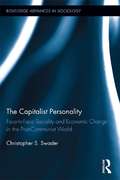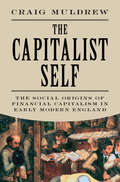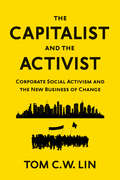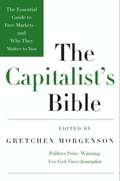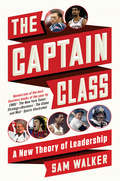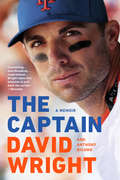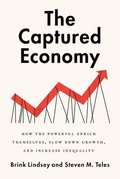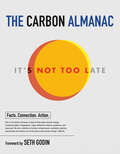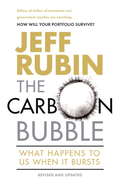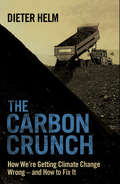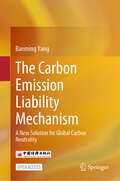- Table View
- List View
The Capital Budgeting Decision, Ninth Edition: Economic Analysis of Investment Projects
by Harold Bierman Jr. Seymour SmidtFully updated and revised by international authorities on the topic, this new version of a classic and established text returns to its roots as a clear and concise introduction to this complex but essential topic in corporate finance. Retaining the authority and reputation of previous editions, it now covers several topics in-depth which are frequently under explored, including distribution policy and capital budgeting. Features new to this edition include: a new chapter on real options new material on uncertainty in decision-making. Easily understandable, and covering the essentials of capital budgeting, this book helps readers to make intelligent capital budgeting decisions for corporations of every type.
The Capital Market of Manila and the Pacific Trade, 1668-1838: Institutions and Trade during the First Globalization (Palgrave Studies in Economic History)
by Juan José Rivas MorenoEconomic history has always emphasized the importance of long-distance trade in the emergence of modern financial markets, yet almost nothing is known about the Manila trade. This book offers the first reconstruction of the capital market of Manila using new archival sources that have never been used in the economic history of Pacific trade. The book explains how trade between Asia and Spanish America across the Pacific, which lasted for 250 years (1571 – 1815) was financed from the city of Manila.The book analyses the political economy and institutional structures of the Manila capital market in the context of the global silver trade, as well as addressing key similarities and differences with European trade routes and differing approaches to colonialism and commerce in Asian waters. It traces how the Manila capital market emerged in a bottom-up process with a redistributive aspect that tied the interests of citizens with the fortunes of trade, using institutions familiar to the public like legacy funds, brotherhoods and lay religious orders to pool liquidity, originate working capital, and internalise the risk of loss at sea. It challenges the notion that there is a normative model for the development of capital markets and introduces an industrial organisation analysis to the broader structure of Early Modern trade in the Spanish Empire. Sitting at the intersection of economic and financial history, global history, imperial history and political economy, this book will be a cutting-edge and valuable resource for a broad range of scholars.
The Capital Markets and Financial Management in Banking
by Robert Hudson Alan Colley Mark LarganFirst published in 2000. Routledge is an imprint of Taylor & Francis, an informa company.
The Capital Markets of Emerging Europe: Institutions, Instruments and Investors
by Li Lian Ong Silvia IorgovaA report from the International Monetary Fund.
The Capital Markets: Evolution Of The Financial Ecosystem (Wiley Finance Ser.)
by Gary Strumeyer Sarah SwammyThe Capital Markets: evolution of the financial ecosystem is the new standard providing practical text book style coverage of this dynamic market and its products. Written by the former President of BNY Mellon Capital Markets, LLC for both financial professionals and novices, The Capital Markets provides a comprehensive macro view of the marketplace and how its products operate. This book is the definitive resource and the companion text to The Capital Markets website. The subject matter offers an authoritative discussion of the fundamentals of both, the fixed income and equity markets, underwriting, securitizations, derivatives, currency among other products through the lens of leading industry practitioners. Key Learning Concepts Understand the impact of both global and domestic regulatory changes Learn about the products that holistically make up the capital markets Explore the components of the infrastructure that underpins these markets Examine the tools used for trading and managing risk Review new product innovations
The Capital Needs of Central Banks (Routledge International Studies In Money And Banking Ser. #61)
by Sue MiltonCentral banks have evolved over many years, and sometimes centuries, as policy-making, not profit-making, institutions, and yet they are structured legally and financially like ‘for-profit’ companies of the twenty-first century. The question is what is an appropriate level of equity, or capital, for a central bank to have so that it can function for policy effectiveness over profit-maximisation, without hindrance to the achievement and maintenance of policy goals? This collection takes the reader through historical, theoretical and factual discussions on why central banks exist and the role – actual and intended – they have in assisting their home nation in achieving monetary and financial stability. The contributions analyse the different ways central banks are funded and how funding arrangements may impact on their independence. The objective is to explore these themes first from the academic and practitioner’s views – those of the economist, accountant and lawyer’s – and then to introduce practical experiences from a range of different central banks, in terms of their economic and socio-political environments. It will be the first time that the theorist and practitioner, the accountant, the economist and the lawyer come together in one volume. The reader will be able to access the full breadth of views on this important subject. The main observations are that there is no single, quantifiable formula that central banks can use to calculate capital levels. Factors to consider are the historical context of central banks and whether capital was ever appropriate to needs at their foundation; the cultural, social and political contexts; and, in terms of the presentation of financial statements, profit and loss sharing arrangements and what accounting conventions are being used. If these are considered alongside the, often idiosyncratic, mandates individual central banks have, a qualitative understanding of what is an appropriate level of capital is achieved. This collection will be of interest to postgraduates and researchers focusing on the role of central banks in monetary economics; as well as a professional audience of central bankers, the BIS, the IMF, World Bank, EBRD and government departments.
The Capital One Story: How the Upstart Financial Institution Charged Toward Market Leadership (The Business Storybook Series)
by Mary Curran HackettWhat can you learn from the most successful companies in the world? The Capital One Story will help you understand and adopt the competitive strategies, workplace culture, and daily business practices that enabled an unlikely credit card startup to revolutionize the credit industry.After twenty-five years in the credit card business, Capital One has earned its place in wallets across the world. When the company&’s two young founders set out to individualize credit, the financial world thought they were crazy…until it was clear that they weren&’t.Working in the banking industry, Richard Fairbank and Nigel Morris saw that the one-size-fits all standard that the credit card companies employed was leaving big money on the table. They cracked the code and figured out how to customize the credit card experience by offering personalized designs, credit limits, and rewards, revolutionizing the way the credit card industry operated.Known for their ubiquitous advertising campaigns with A-list talent such as Jennifer Garner and Samuel L. Jackson, the youngest bank in the business was once turned down by every one of their competitors but has since grown to dominate the industry.Through the story of Capital One, you&’ll learn:How to recognize underserved sections of a market.How rejection by every company in the business doesn&’t mean it&’s time to quit.How to determine what people want and how to get it to them.How to employ marketing campaigns that will change the way people live.Discover how this iconic organization got it right and created a successful long-lasting business, and how you can do the same for your company.
The Capital Order: How Economists Invented Austerity and Paved the Way to Fascism
by Clara E. Mattei"A must-read, with key lessons for the future."—Thomas Piketty A groundbreaking examination of austerity’s dark intellectual origins. For more than a century, governments facing financial crisis have resorted to the economic policies of austerity—cuts to wages, fiscal spending, and public benefits—as a path to solvency. While these policies have been successful in appeasing creditors, they’ve had devastating effects on social and economic welfare in countries all over the world. Today, as austerity remains a favored policy among troubled states, an important question remains: What if solvency was never really the goal? In The Capital Order, political economist Clara E. Mattei explores the intellectual origins of austerity to uncover its originating motives: the protection of capital—and indeed capitalism—in times of social upheaval from below. Mattei traces modern austerity to its origins in interwar Britain and Italy, revealing how the threat of working-class power in the years after World War I animated a set of top-down economic policies that elevated owners, smothered workers, and imposed a rigid economic hierarchy across their societies. Where these policies “succeeded,” relatively speaking, was in their enrichment of certain parties, including employers and foreign-trade interests, who accumulated power and capital at the expense of labor. Here, Mattei argues, is where the true value of austerity can be observed: its insulation of entrenched privilege and its elimination of all alternatives to capitalism. Drawing on newly uncovered archival material from Britain and Italy, much of it translated for the first time, The Capital Order offers a damning and essential new account of the rise of austerity—and of modern economics—at the levers of contemporary political power.
The Capital Order: How Economists Invented Austerity and Paved the Way to Fascism
by Clara E. Mattei"A must-read, with key lessons for the future."—Thomas Piketty A groundbreaking examination of austerity’s dark intellectual origins. For more than a century, governments facing financial crisis have resorted to the economic policies of austerity—cuts to wages, fiscal spending, and public benefits—as a path to solvency. While these policies have been successful in appeasing creditors, they’ve had devastating effects on social and economic welfare in countries all over the world. Today, as austerity remains a favored policy among troubled states, an important question remains: What if solvency was never really the goal? In The Capital Order, political economist Clara E. Mattei explores the intellectual origins of austerity to uncover its originating motives: the protection of capital—and indeed capitalism—in times of social upheaval from below. Mattei traces modern austerity to its origins in interwar Britain and Italy, revealing how the threat of working-class power in the years after World War I animated a set of top-down economic policies that elevated owners, smothered workers, and imposed a rigid economic hierarchy across their societies. Where these policies “succeeded,” relatively speaking, was in their enrichment of certain parties, including employers and foreign-trade interests, who accumulated power and capital at the expense of labor. Here, Mattei argues, is where the true value of austerity can be observed: its insulation of entrenched privilege and its elimination of all alternatives to capitalism. Drawing on newly uncovered archival material from Britain and Italy, much of it translated for the first time, The Capital Order offers a damning and essential new account of the rise of austerity—and of modern economics—at the levers of contemporary political power.
The Capitalism Papers: Fatal Flaws of an Obsolete System
by Jerry ManderIn the vein of his bestseller, Four Arguments for the Elimination of Television, nationally recognized social critic Jerry Mander researches, discusses, and exposes the momentous and unsolvable environmental and social problem of capitalism.Mander argues that capitalism is no longer a viable system: "What may have worked in 1900 is calamitous in 2010." Capitalism, utterly dependent on never-ending economic growth, is an impossible absurdity on a finite planet with limited resources. Climate change, together with global food, water, and resource shortages, are only the start.Mander draws attention to capitalism's obsessive need to dominate and undermine democracy, as well as to diminish social and economic equity. Designed to operate free of "morality," the system promotes "permanent war" as a key economic strategy. Worst of all, the problems of capitalism are intrinsic to the form. Many organizations are already anticipating the breakdown of the system and are working to define new hierarchies of democratic values that respect the carrying capacities of the planet.
The Capitalism Papers: Fatal Flaws of an Obsolete System
by Jerry ManderIn the vein of his bestseller, Four Arguments for the Elimination of Television, nationally recognized social critic Jerry Mander researches, discusses, and exposes the momentous and unsolvable environmental and social problems of capitalism.Mander argues that capitalism is no longer a viable system: "What may have worked in 1900 is calamitous in 2010." Capitalism, utterly dependent on never-ending economic growth, is an impossible absurdity on a finite planet with limited resources. Climate change, together with global food, water, and resource shortages, is only the start.Mander draws attention to capitalism's obsessive need to dominate and undermine democracy, as well as to diminish social and economic equity. Designed to operate free of morality, the system promotes permanent war as a key economic strategy. Worst of all, the problems of capitalism are intrinsic to the form. Many organizations are already anticipating the breakdown of the system and are working to define new hierarchies of democratic values that respect the carrying capacities of the planet.
The Capitalist Comeback: The Trump Boom and the Left's Plot to Stop It
by Andrew PuzderAndy Puzder, the former CEO of Carl's Jr. and Hardee's, says that "capitalism" is not a dirty word, and thankfully President Trump understands this; his pro-business policies will bring back economic growth and secure our future.As a successful CEO in the restaurant industry, Andy Puzder uniquely understands how important the profit motive is to our country's ultimate prosperity. Furthermore, as the grandson of immigrants, the son of a car salesman, and someone who worked his way up from earning minimum wage to running an international business, he has a first-hand view of how America's exceptional capitalist spirit can lift everyone to success.In 2016, the American people faced a stark choice between two very different presidential candidates. Hillary Clinton spent most of her adult life involved in politics and promised to uphold and advance the progressive legacy of President Barack Obama who had first won the White House on promises to "spread the wealth around." Donald Trump, on the other hand, came from the business world, was an unapologetic capitalist, used his own personal wealth as inspiration, and promised simply to "Make America Great Again."By choosing Trump over Clinton, the American people put a stop to decades of government expansion under progressive leadership, and they might just have saved our economy by doing so. America was once a land where everyone was encouraged to seek their fortune - the more prosperous our citizens, the more our whole society could in turn prosper. But leftist forces in the United States have been seeking to tarnish the pursuit of prosperity and to paint profit as an evil motivation fit only for greedy plutocrats. Andrew Puzder understands this first-hand after a progressive smear campaign stopped him from joining President Trump's cabinet. As Puzder explains in his new book, The Capitalist Comeback, this was an act of desperation from a left wing facing irrelevance with a pro-business president in the White House. From its roots in the Progressive Era to labor unions to education to entertainment to its political resurgence with avowed socialist candidates such as Bernie Sanders, Puzder traces the development of the anti-profit forces in the United States and shows how, under President Trump, they can be vanquished for good.
The Capitalist Manifesto: Why The Global Free Market Will Save The World
by Johan NorbergMarx and Engels were right when they observed in the Communist Manifesto that free markets had in a short time created greater prosperity and more technological innovation than all previous generations combined. A century and a half later, all the evidence shows that capitalism has lifted millions and millions from hunger and poverty. Today's story about global capitalism, shared by right-wing and left-wing populists, but also by large sections of the political and economic establishment, does not deny that prosperity has been created, but it says it ended up in far too few hands. This in turn has made it popular to talk about the global economy as a geopolitical zero-sum game, where we have to fight to control new innovations, introduce trade barriers and renationalize value chains. While, more broadly, capitalism is accused of fueling glaring inequality, populist revolts, climate change and China's global conquest. In this incisive and passionate investigation, Johan Norberg instead states the case for capitalism and the vital role played by the free market in today's uncertain world. Ultimately, he argues that that a move away from global capitalism would not only squeeze the growth out of the economy but also deepen an already large social exclusion for the vulnerable - for the world's poor, it would be a killing blow.
The Capitalist Personality: Face-to-Face Sociality and Economic Change in the Post-Communist World (Routledge Advances in Sociology #86)
by Christopher S. SwaderModern capitalism favors values that undermine our face-to-face bonds with friends and family members. Focusing on the post-communist world, and comparing it to more "developed" societies, this book reveals the mixed effects of capitalist culture on interpersonal relationships. While most observers blame the egoism and asocial behavior found in new free-market societies on their communist pasts, this work shows how relationships are also threatened by the profit orientations and personal ambition unleashed by economic development. Successful people in societies as diverse as China, Russia, and Eastern Germany adjust to the market economy at a social cost, relaxing their morals in order to obtain success and succumbing to increased material temptations to exploit relationships for their own financial and professional gain. The capitalist personality is internally troubled as a result of this "sellout," but these qualms subside as it devalues intimate qualitative bonds with others. This book also shows that post-communists are similarly individualized as people living in Western societies. Capitalism may indeed favor values of independence, creativity, and self-expressiveness, but it also rewards self-centeredness, consumerism, and the stripping down of morality. As is the case in the West, capitalist culture fosters an internally conflicted and self-centered personality in post-communist societies.
The Capitalist Self: The Social Origins of Financial Capitalism in Early Modern England
by Craig MuldrewIn this radical reinterpretation of the Financial Revolution, Craig Muldrew redefines our understanding of capitalism as a socially constructed set of institutions and beliefs. Financial institutions, including the Bank of England and the stock market, were just one piece of the puzzle. Alongside institutional developments, changes in local credit networks involving better accounting, paper notes and increased mortgaging were even more important. Muldrew argues that, before a society can become capitalist, most of its members have to have some engagement with 'capital' as a thing – a form of stored intangible financial value. He shows how previous oral interpersonal credit was transformed into capital through the use of accounting and circulating paper currency, socially supported by changing ideas about the self which stressed individual savings and responsibility. It was only through changes throughout society that the framework for a concept like capitalism could exist and make sense.
The Capitalist and the Activist: Corporate Social Activism and the New Business of Change
by Tom C. Lin2023 Axiom Business Books Award Silver Medalist (Business Commentary)2023 Nautilus Book Award Silver Medalist (Social Change & Social Justice)This is the first in-depth examination of the important ongoing fusion of activism, capitalism, and social change masterfully told through a compelling narrative filled with vivid stories and striking studies.Corporations and their executives are at the forefront of some of the most contentious and important social issues of our time. Through pronouncements, policies, boycotts, sponsorships, lobbying, and fundraising, corporations are actively engaged in issues like immigration reform, gun regulation, racial justice, gender equality, and religious freedom. Despite corporate social activism being everywhere these days-witness how quickly companies and progressives united to oppose North Carolina's bathroom bill or support the Black Lives Matter movement-there has been no in-depth examination of the far-reaching consequences of this movement. What first principles should guide businesses' approaches? How should activists engage with businesses in a way that is most beneficial to their causes? What are potential pitfalls and risks associated with corporate social activism for activists, businesses, and society at large? Weaving studies and stories, Temple University professor of law, Tom C. W. Lin offers a road map for how we got here and a compass for where we are going as a nation of capitalists and activists seeking profit and progress.
The Capitalist's Bible
by Gretchen MorgensonEverything you ever wanted-and needed-to know about capitalism . . . but were afraid to ask. What is capitalism, and will it survive? What does globalization really mean-and how does it affect your bank account? If capitalism, left unchecked, has caused disasters like the Great Depression and the financial crisis of 2008-09, why has it been the economic system of choice for centuries? To many people, the complex, jargon-rich world of capitalism can be intimidating, raising more questions than it answers. However, as the excesses and failures of free-market capitalism continue to hold sway over the daily news and our daily lives, understanding our economic system-including where it has succeeded and where it has not-is more important than ever. Edited by New York Times business journalist Gretchen Morgenson, The Capitalist's Bible is the essential reference on capitalism and how it works-from the people who champion it to the mechanisms and institutions that uphold it to the terms and laws that define it. Whether you seek a more well-rounded understanding of the ideology that underwrites America's-and, increasingly, the world's-economy, or simply wish to be able to speak more knowledgeably on the subject in conversation, this book is an invaluable tool for understanding capitalism.
The Captain Class: A New Theory of Leadership
by Sam WalkerThe founding editor of The Wall Street Journal’s sports section profiles the greatest teams in history and identifies the counterintuitive leadership qualities of the unconventional men and women who drove them to succeed.The secret to winning is not what you think it is. It’s not the coach. It’s not the star. It’s not money. It’s not a strategy. It’s something else entirely. Several years ago, Sam Walker set out to answer one of the most hotly debated questions in sports: What are the greatest teams of all time? He devised a formula, then applied it to thousands of teams from leagues all over the world, from the NBA to the English Premier League to Olympic field hockey. When he was done, he had a list of the sixteen most dominant teams in history. At that point, he became obsessed with another, more complicated question: What did these freak teams have in common? As Walker dug into their stories, a pattern emerged: Each team had the same type of captain—a singular leader with an unconventional skill set who drove it to achieve sustained, historic greatness. Fueled by a lifetime of sports spectating, twenty years of reporting, and a decade of painstaking research, The Captain Class tells the surprising story of what makes teams exceptional. Drawing on original interviews with athletes from two dozen countries, as well as general managers, coaches, executives, and others skilled at building teams, Walker identifies the seven core qualities of this Captain Class—from extreme doggedness and emotional control to a knack for nonverbal communication to tactical aggression and the courage to stand apart. Told through riveting accounts of some of the most pressure-soaked moments in sports history—from Bill Russell’s legendary “Coleman Play” in the 1957 NBA Finals to Barcelona’s “Figo Game” against Real Madrid in 2000—The Captain Class doesn’t just bring these events to life; it presents a fresh, counterintuitive take on leadership that can be applied to a wide spectrum of competitive disciplines. The men and women who make up the Captain Class were never the most skilled athletes, nor were they gifted orators or paragons of sportsmanship. They were often role players who were allergic to the spotlight. In short, the seven attributes they shared challenge your assumptions of what inspired leadership looks like.Advance praise for The Captain Class“Well-researched, wildly entertaining, and thought-provoking. In The Captain Class, Sam Walker presents compelling narratives about the secret ingredient to the greatest teams of all time—and quickly makes you reexamine long-held beliefs about leadership and the glue that binds winning teams together.”—Theo Epstein, President of Baseball Operations for the Chicago Cubs“In The Captain Class, Sam Walker gives us important and original insights into the mysterious ingredients of transformative leadership. A stunning mix of research and narrative.”—Susan Cain, bestselling author of Quiet “If you care about leadership, talent development, or the art of competition, you need to read this immediately.”—Daniel Coyle, bestselling author of The Talent Code“The Captain Class is a brilliant hybrid: one-part detective story and one-part leadership book, set in the world of sports, and dedicated to a fascinating mystery: What sets apart the greatest teams of all time? I’m not even a sports nut and I couldn't put it down.”—Dan Heath, co-author of the New York Times bestseller Made to Stick
The Captain: A Memoir
by David Wright Anthony DiComoThe memoir from the last Mets captain, David Wright, one of the most admired players in recent MLB history, about his inspiring and deep commitment to the game. David Wright played his entire fourteen-year Major League Baseball career for the New York Mets. And when he came back time and again from injury, he demonstrated the power of hard work, commitment, and love of the game. Wright was nicknamed "Captain America" after his performance in the 2013 World Baseball Classic. He is a seven-time All-Star, a two-time Gold Glove Award winner, a two-time Silver Slugger Award winner, and a member of the 30-30 club. He holds Mets franchise records for most career RBIs, doubles, total bases, runs scored, walks, sacrifice flies, times on base, extra base hits, strikeouts, double plays, and hits. He was named captain of the Mets in 2013, becoming the fourth captain in the team's history. Now the widely admired, beloved New York Mets third baseman and captain tells it from his perspective.
The Captured Economy: How The Powerful Become Richer, Slow Down Growth, And Increase Inequality
by Brink Lindsey Steven TelesFor years, America has been plagued by slow economic growth and increasing inequality. In The Captured Economy, Brink Lindsey and Steven M. Teles identify a common factor behind these twin ills: breakdowns in democratic governance that allow wealthy special interests to capture the policymaking process for their own benefit. They document the proliferation of regressive regulations that redistribute wealth and income up the economic scale while stifling entrepreneurship and innovation. They also detail the most important cases of regulatory barriers that have worked to shield the powerful from the rigors of competition, thereby inflating their incomes: subsidies for the financial sector's excessive risk taking, overprotection of copyrights and patents, favoritism toward incumbent businesses through occupational licensing schemes, and the NIMBY-led escalation of land use controls that drive up rents for everyone else. An original and counterintuitive interpretation of the forces driving inequality and stagnation, The Captured Economy will be necessary reading for anyone concerned about America's mounting economic problems and how to improve the social tensions they are sparking.
The Carbon Almanac: It's Not Too Late
by The Carbon Almanac NetworkWhen it comes to the climate, we don&’t need more marketing or anxiety. We need established facts and a plan for collective action.The climate is the fundamental issue of our time, and now we face a critical decision. Whether to be optimistic or fatalistic, whether to profess skepticism or to take action. Yet it seems we can barely agree on what is really going on, let alone what needs to be done. We urgently need facts, not opinions. Insights, not statistics. And a shift from thinking about climate change as a &“me&” problem to a &“we&” problem. The Carbon Almanac is a once-in-a-lifetime collaboration between hundreds of writers, researchers, thinkers, and illustrators that focuses on what we know, what has come before, and what might happen next. Drawing on over 1,000 data points, the book uses cartoons, quotes, illustrations, tables, histories, and articles to lay out carbon&’s impact on our food system, ocean acidity, agriculture, energy, biodiversity, extreme weather events, the economy, human health, and best and worst-case scenarios. Visually engaging and built to share, The Carbon Almanac is the definitive source for facts and the basis for a global movement to fight climate change. This isn&’t what the oil companies, marketers, activists, or politicians want you to believe. This is what&’s really happening, right now. Our planet is in trouble, and no one concerned group, corporation, country, or hemisphere can address this on its own. Self-interest only increases the problem. We are in this together. And it&’s not too late for concerted, collective action for change.
The Carbon Bubble
by Jeff RubinFor the first time at book length, bestselling author and economist Jeff Rubin addresses Canada's national economic future--and the financial security of all Canadians. Since 2006 and the election of the 1st Harper government, the vision of Canada's future as an energy superpower has driven the political agenda, as well as the fast-paced development of Alberta's oil sands and the push for more pipelines across the country to bring that bitumen to market. Anyone who objects is labeled a dreamer, or worse--an environmentalist: someone who puts the health of the planet ahead of the economic survival of their neighbours. In The Carbon Bubble, Jeff Rubin compellingly shows how Harper's economic vision for the country is dead wrong. Changes in energy markets in the US--where domestic production is booming while demand for oil is shrinking--are quickly turning Harper's dream into an economic nightmare. The same trade and investment ties to oil that pushed the Canadian dollar to record highs are now pulling it down, and the Toronto Stock Exchange, one of the most carbon-intensive stock indexes in the world--with over 25 percent market capitalization in oil and gas alone--will be increasingly exposed to the rest of the world's efforts to reduce carbon emissions. Rubin argues that there is a lifeline to a better future. The very climate change that will leave much of the country's carbon unburnable could at the same time make some of Canada's other resource assets more valuable: our water and our land. In tomorrow's economy, he argues, Canada won't be an energy superpower, but it has the makings of one of the world's great breadbaskets. And in the global climate that the world's carbon emissions are inexorably creating, food will soon be a lot more valuable than oil.
The Carbon Crunch: How We're Getting Climate Change Wrong—and How to Fix It
by Dieter HelmAn economist&’s take on &“why the world&’s efforts to curb the carbon dioxide emissions behind global warming have gone so wrong, and how it can do better&” (Financial Times). Despite commitments to renewable energy and two decades of international negotiations, global emissions continue to rise. Coal, the most damaging of all fossil fuels, has actually risen from 25% to almost 30% of world energy use. And while European countries congratulate themselves on reducing emissions, they&’ve increased their carbon imports from China and other developing nations, who continue to expand their coal use. As standards of living improve in developing countries, coal use can only increase as well—and global temperatures along with it. Written by an Oxford economist who specializes in environmental issues, this book goes beyond pieties and pipe dreams to address the practical realities that are preventing us from making progress on this crucial issue—and what we can do differently before it&’s too late. &“Should be compulsory reading for the entire political class as well as the bureaucratic elite and the commentariat.&”—New Statesman &“An optimistically levelheaded book about actually dealing with global warming.&”—Kirkus Reviews (starred review) &“A powerful and heartfelt plea for hard-nosed realism.&”—New Scientist
The Carbon Dioxide Revolution: Challenges and Perspectives for a Global Society
by Michele Aresta Angela DibenedettoThis book focuses on carbon dioxide and its global role in our everyday life. Starting with society's dependency on energy, it demonstrates the various sources of carbon dioxide and discusses the putative effects of its accumulation in the atmosphere and its impact on the climate. It then provides an overview of how we can reduce carbon dioxide production and reviews innovative technologies and alternative energy resources. The book closes with a perspective on how carbon dioxide can be utilized reasonably and how mimicking nature can provide us with a solution. Using simple language, this book discusses one of today's biggest challenges for the future of our planet in a way that is understandable for the general public. The authors also provide deep insights into specific issues, making the book a useful resource for researchers and students.
The Carbon Emission Liability Mechanism: A New Solution for Global Carbon Neutrality
by Baoming YangThis open access book presents a novel Carbon Emission Liability Mechanism (CELM) and an integrated global Carbon Pricing Mechanism, based on a comprehensive analysis of the evolution of economic theory related to global climate change and the practice of carbon pricing instruments over the past 30 years. It further outlines a top-level design and implementation blueprint global based on CELM to achieve global carbon neutrality.For the first time, the CELM mechanism effectively addresses the three fundamental questions regarding carbon emissions: who should be liable for carbon emission, how much liability, and how to offset it. The introduction of CELM may unveil a feasible third path towards global carbon neutrality, and effectively address numerous challenges of carbon tax and Emission Trading System.CELM facilitates the creation of an efficient, cost-effective and comprehensive societal carbon footprint database, and addresses issues related to international carbon border regulation mechanism. While the world is struggling to tackcle the imminent climate crisis, CELM offers a refreshing global carbon neutrality solution, with its characteristics of more fair, more efficient, and less expensive, bringing new alternative options for the international community.
